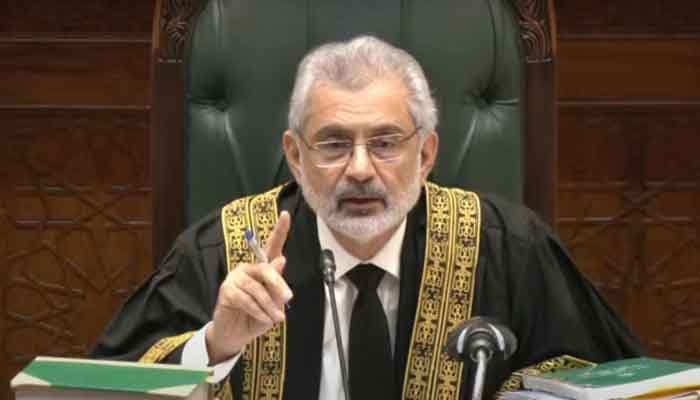ISLAMABAD – Chief Justice of Pakistan Qazi Faez Isa observed that political parties are not subordinate to judges or the Chief Justice, emphasizing that it is the authority of the party head to decide if a member has deviated.
A SC five-member bench led by Chief Justice of Pakistan is hearing review petitions related to the interpretation of Article 63-A of the Constitution.
During the proceedings, the lawyer for former PTI chairman Imran Khan objected to the composition of the bench, denying the hearing on behalf of his client, after which the Supreme Court appointed him as a judicial assistant.
Barrister Ali Zafar, starting his arguments as a judicial assistant, noted that the original request from the Supreme Court Bar was related to voting in the no-confidence motion. He argued that the Supreme Court incorrectly combined the presidential reference with constitutional petitions and dismissed the constitutional petitions, stating that they had already given an opinion on the reference, which limited the scope of review.
The Chief Justice remarked that while someone may be dissatisfied with the Constitution or the death penalty, everyone is bound to enforce it. He questioned, “Can any judge, after taking an oath, claim they are not happy with this clause of the Constitution?” He added that every dictator claims they will eliminate all corrupt members of the assembly, leading people to join military regimes, only to then begin singing the praises of democracy.
Barrister Ali Zafar stated that the Supreme Court has significantly advanced the principle of the right to life provided in the Constitution. He emphasized that advancing the principle of a fundamental right does not equate to rewriting the Constitution. He noted that the Constitution grants the right to form political parties, but it does not specify that parties can contest elections. Courts have interpreted this to allow political parties to participate in elections, and while subsequent legislation followed, the judicial interpretation came first.
Justice Jamal Mandokhel asserted that the right to vote belongs to the member of parliament, questioning how it could be considered a right of the political party. Chief Justice Qazi Faez Isa asked who judges were to declare that a member had deviated, reiterating that it is the party leader’s discretion to issue a declaration of defection. He emphasized that members of the assembly or political parties are not subordinate to any judge or Chief Justice; rather, political parties operate under their leaders.
Justice Amin-ud-Din Khan inquired who elects the head of the parliamentary party, to which Barrister Ali Zafar replied that members of parliament elect their parliamentary leader. Justice Jamal Mandokhel reiterated that the right to vote is held by the Member of Parliament, not by the political party.
The Chief Justice of Pakistan questioned PPP lawyer Farooq H. Naek about the difference between a parliamentary party and a parliamentary leader, to which Naek explained that party elections are held under the Election Act, determining the party leader.
A judicial assistant stated that if a party leader fails to follow the directives of the parliamentary party, they can send a disqualification reference.
Barrister Ali Zafar told the court that members of the assembly receive instructions from the parliamentary party regarding whether or not to vote. He added that if a member fails to follow these instructions, the party leader can file for disqualification. The Chief Justice responded that, according to this reasoning, voting against the party would be tantamount to committing suicide, as those votes would not be counted, and the member would have to relinquish their seat. He noted that if someone disagrees with party policy, they have the option to resign.
The judicial assistant expressed hope that perhaps disqualification would not occur and the seat could be retained. The court asserted that no one would be allowed to misuse their right to vote, prompting Justice Qazi Faez Isa to ask if this interpretation was democratic.
He remarked that judges are not elected and should remain within their jurisdiction, adding that the argument presented was contrary to democracy, recalling that during martial law, everyone tends to become a mere rubber stamp.










